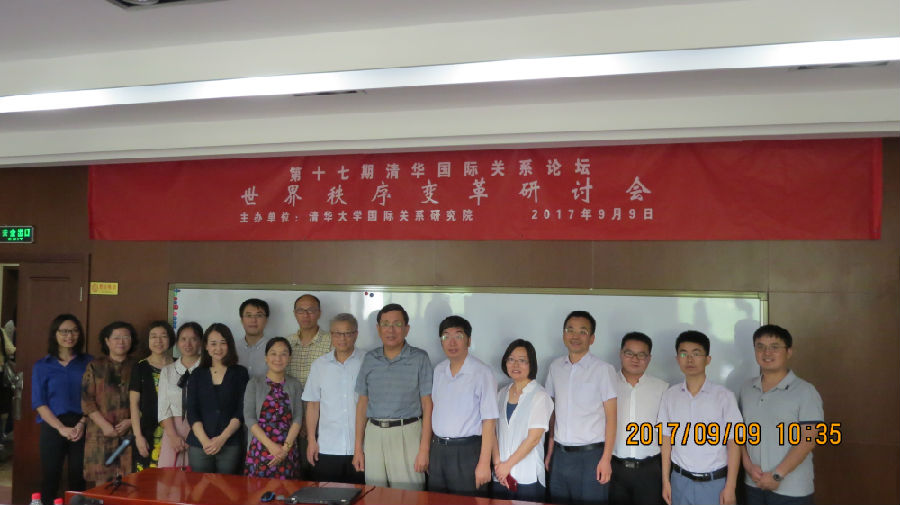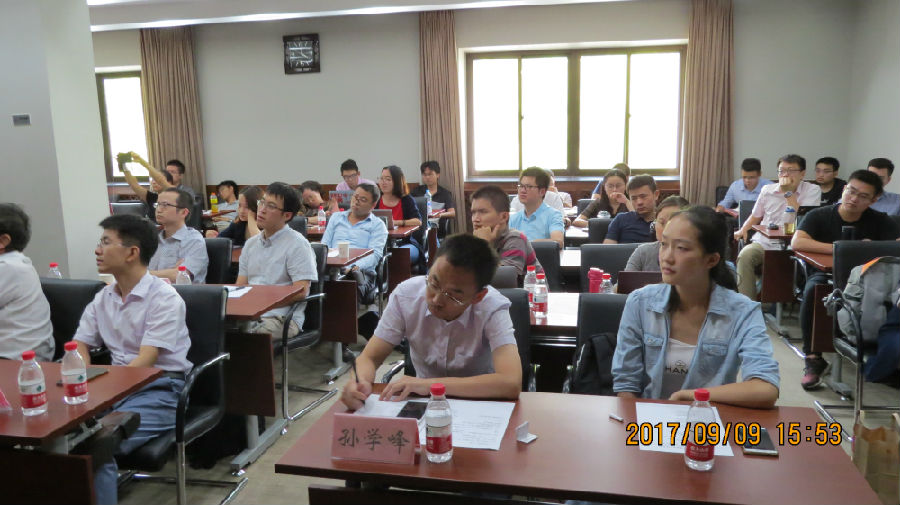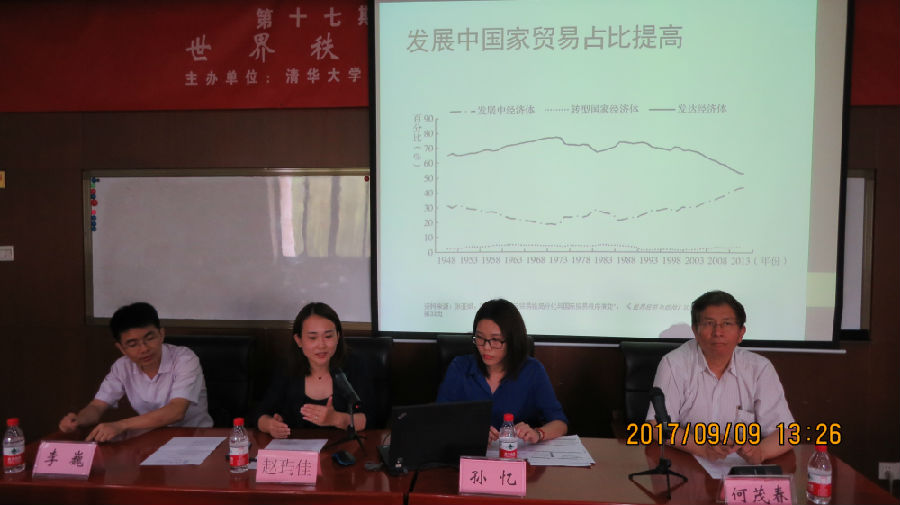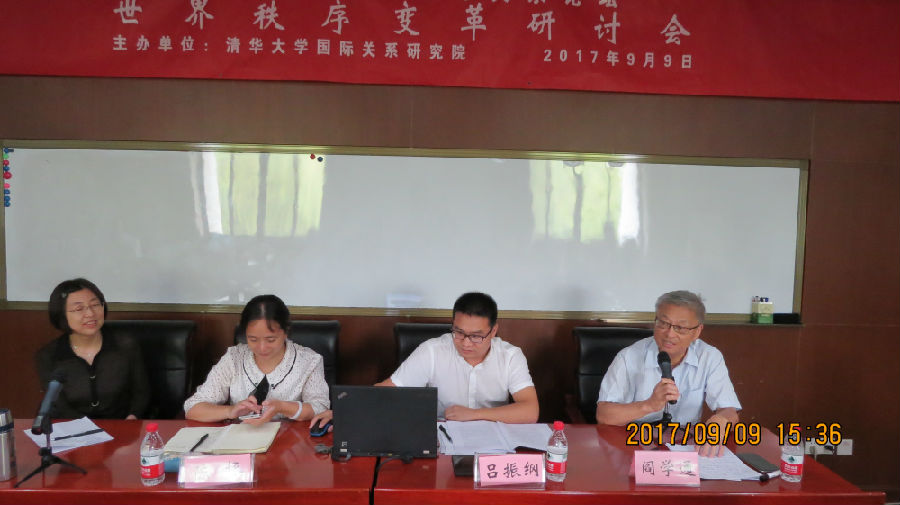On September 9, 2017, the 17thInternational Relations Forum,organized by the Institute of International Relations of Tsinghua University, was successfully held at Tsinghua Jinchun Garden Hotel. This meeting, themed "Changes in World Order", focuses on the trend of the future international orders. Prof. Sun Xuefeng, the executive vice president of the Institute of International Relations of Tsinghua University, gave a welcome speech and presided over this meeting. The morning meetings were hosted seperately by Prof. Qi Haixia from Tsinghua University Instituteof International Relations and Xu Jin, the vice researcher of the Chinese Academy of Social Sciences Institute of World Economics and Politics. Wonderful comments on the speeches of the guest speakers were given by the Commissioner of the National People's Congress Foreign Affairs Committee Chen Xiao Gong, and Prof. Li Bin of Tsinghua University Institute of International Relations. Concerning this theme, an in-depth discussion was conducted by the scholars from the Tsinghua University, the Chinese Academy of Social Sciences, Renmin University of China, Shanghai Jiaotong University, Jinan University, and other institutes. The morning session is divided into two parts, which are "international ocean order and changes in water order" and "international cyber order and changes in nuclear order".

Li Zhipei, an assistant researcher at the Asia-Pacific Institute of the Chinese Academy of Social Sciences, argues that water, as the most basic resource for survival and development of human society, can influence the interaction and evolution of regional entities. Through case analysis, he found that water resources can affect the construction of regional identity and norms, can create conditions for external intervention. China should give full play to the geographical advantages and the status of major countries to understand the intrinsic relationship between water and changes in regional order from three perspectives, the concept, interests, and ability. Then to enhance the ability and initiative to build regional orders. In the session of the comments, General Chen Xiaogong elaborated on the impact of the water order on the real international situation with his own experience and pointed out the current problems of the existing international conventions and agreements of the sea and the importance of establishing a fair international maritime order.

Qi Hao, an assistant researcher at the Institute of American Studies, Chinese Academy of Social Sciences, argues that studying marine order is of great significance to the rise of China and the reconstruction of international order, pointing out problems such as the lack of clarification on marine orders and the low degree of theorization. On this basis, researcher Qi Hao reviewed the evolution of the international order, and stressed that the nature of the motivator for the evolution of the international order is the evolution of concepts.
Lang Ping, an associate researcher at the Institute of World Economics and Politics, Chinese Academy of Social Sciences, points out that in the fields of cyberspace, the establishment of a network order is essentially a process of different participators establishing international norms by establishing appropriate institutional arrangements to solve different levels of problems and conflicts. The formation of the future international order of cyberspace mainly manifests itself as the choice of values, the choice of the institutional platforms and the rules-making. The evolution mechanism behind the formation of the order depends on the power game among the states and among the state and the non-state participators. The cooperation and competition between China and the United States will be an important reference that affects the establishment of international order in cyberspace.
Hu Gaochen, a doctoral student from Tsinghua University Department of International Relations, argues that due to the complexity and diversity of the international nuclear development, the situation of the disorder is difficult to alleviate in the short term. The deviation between patterns of strength and the institutional arrangements, the disconnection between cold war mentality of nuclear and today's nuclear situation, and the disconnection between systematic norms and current reality are the main drivers that lead the current nuclear situation to increased disorder. China should act as an example to support multilateralism and actively promote cooperation with nuclear powers on regional nuclear proliferation, playing a proactive role in the peaceful solving of regional nuclear proliferation.

The afternoon forums focused on topics such as changes in international economic order, the evolution of international norms, and changes in the source of a government’s legitimacy. The afternoon sessions were held by Prof. Li Wei from the Faculty of International Relations of the Renmin University of China and associate Prof. Xing Yue from Tsinghua University Institute of International Relations respectively. Prof. He Maochun and Prof. Yan Xuedong from the Tsinghua University Institute of International Relations commented on the speeches of guest speakers in the afternoon. Zhao Yujia, the Postdoctoral of Tsinghua University International Relations shared her opinions, followed by Ph.D. Sun Yi from the Renmin University of China, lecturer Chen Zheng from Shanghai Jiaotong University School of International and Public Affairs, Ph.D. Lu Zhenang from Jinan University International Relations College, and other present scholars. They reported their studies in the fields of the transfer of world power and the change of the trade order, the evolution of international financial order, the development of globalized activities and the sovereignty regression, and the development of the tributary system in East Asia.

By the end of the forum, Prof. Yan Xuetong of the Tsinghua University Institute of International Relations had reviewed the history of the International Relations Forum and had encouraged contemporary Chinese scholars to make scientific explanations on the new phenomenon in international relations. The seminar ended at 5 pm and a group picture was taken afterwards.

